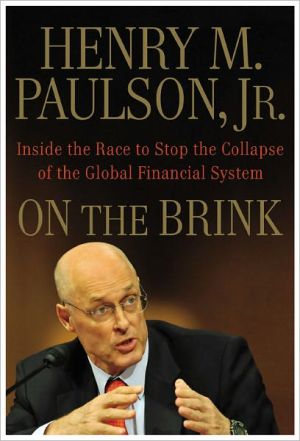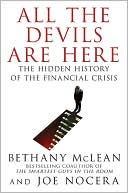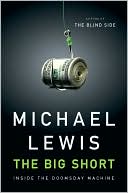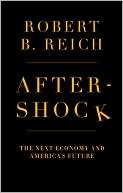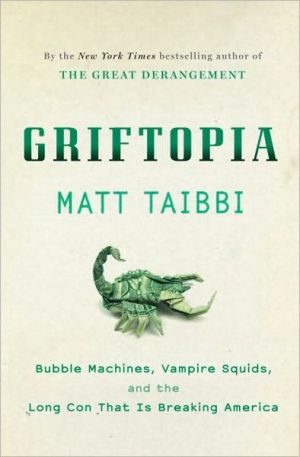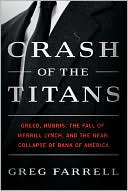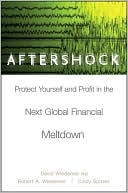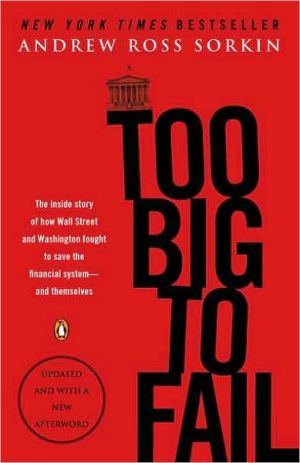On the Brink: Inside the Race to Stop the Collapse of the Global Financial System
When Hank Paulson, the former CEO of Goldman Sachs, was appointed in 2006 to become the nation's next Secretary of the Treasury, he knew that his move from Wall Street to Washington would be daunting and challenging.\ But Paulson had no idea that a year later, he would find himself at the very epicenter of the world's most cataclysmic financial crisis since the Great Depression. Major institutions including Bear Stearns, Fannie Mae, Freddie Mac, Lehman Brothers, AIG, Merrill Lynch, and...
Search in google:
When Hank Paulson, the former CEO of Goldman Sachs, was appointed in 2006 to become the nation's next Secretary of the Treasury, he knew that his move from Wall Street to Washington would be daunting and challenging.But Paulson had no idea that a year later, he would find himself at the very epicenter of the world's most cataclysmic financial crisis since the Great Depression. Major institutions including Bear Stearns, Fannie Mae, Freddie Mac, Lehman Brothers, AIG, Merrill Lynch, and Citigroup, among others-all steeped in rich, longstanding tradition-literally teetered at the edge of collapse. Panic ensnared international markets. Worst of all, the credit crisis spread to all parts of the U.S. economy and grew more ominous with each passing day, destroying jobs across America and undermining the financial security millions of families had spent their lifetimes building. This was truly a once-in-a-lifetime economic nightmare. Events no one had thought possible were happening in quick succession, and people all over the globe were terrified that the continuing downward spiral would bring unprecedented chaos. All eyes turned to the United States Treasury Secretary to avert the disaster.This, then, is Hank Paulson's first-person account. From the man who was in the very middle of this perfect economic storm, ON THE BRINK is Paulson's fast-paced retelling of the key decisions that had to be made with lightning speed. Paulson puts the reader in the room for all the intense moments as he addressed urgent market conditions, weighed critical decisions, and debated policy and economic considerations with of all the notable players-including the CEOs of top Wall Street firms as well as Ben Bernanke, Timothy Geithner, Sheila Bair, Nancy Pelosi, Barney Frank, presidential candidates Barack Obama and John McCain, and then-President George W. Bush.More than an account about numbers and credit risks gone bad, ON THE BRINK is an extraordinary story about people and politics-all brought together during the world's impending financial Armageddon. The New York Times - Roger Lowenstein …the primary, and sizable, contribution of this book is the inside view it affords of the often limited powers of the federal government…While he had the stalwart help of Ben Bernanke and Timothy Geithner, Paulson had to wrestle with more, and more burning, crises than any Treasury secretary in history. Some less-than-perfect decisions were hardly to be avoided. His account bolsters the view that however little he anticipated the bust, he did his earnest best to restore order. And who can deny, as Paulson writes: "It could have been so much worse."
\ Publishers WeeklyPaulson (U.S. Treasury Secretary from July ‘07 to January '09) has come under sharp criticism from both sides of the political spectrum for his role in bailing out the banks. In this fast-moving, insider's account of "the worst financial crisis since the Great Depression," he tells his side of the story. Working closely with Treasury Secretary Timothy Geithner (then president of the New York Federal Reserve Bank) and Ben Bernanke (chairman of the Federal Reserve Board), he cobbled together a series of rescue operations to prevent the collapse of major U.S. financial institutions. Paulson, and the rest of the team who worked tirelessly to avert an economic catastrophe, command respect, but his contention that their actions were the only possible approach to the crisis leaves many open questions. He has little of substance to say about the precipitating events, and his equally Reaganesque and Kafkaesque calls to get "the government out of the private sector as quickly as possible" result in a somewhat unconvincing page turner. (Mar.)\ \ \ \ \ Library JournalAs treasury secretary, former Goldman Sachs CEO Paulson was at the center of the maelstrom of the 2007–08 financial crisis. He recounts in copious detail his day-to-day dealings with partisan politicians and desperate financial executives. He tells of President Bush's steady support and the vital cooperation he received from the Federal Reserve's Ben Bernanke and Timothy Geithner. Paulson goes over the various steps and missteps he and his colleagues took in dealing with the crisis, sharing both his inner thoughts during the crisis and looking back on what was accomplished, thus filling in many of the gaps left by other books on the subject. He says that to save free-enterprise capitalism, he had to preside over government intervention and bank bailouts, so "I had been forced to do things I did not believe in to save what I did believe in." VERDICT This is the ultimate insider's account of the crisis, and, owing to its evenhanded tone and penetrating insights into government actions, it will also remain an important contribution to the historical record of the crisis, essential reading for everyone interested in knowing what happened. It superbly complements broader works such as Charles Gasparino's Sellout and Roger Lowenstein's The End of Wall Street.—Lawrence Maxted, Gannon Univ. Lib., Erie, PA\ \ \ Roger Lowenstein…the primary, and sizable, contribution of this book is the inside view it affords of the often limited powers of the federal government…While he had the stalwart help of Ben Bernanke and Timothy Geithner, Paulson had to wrestle with more, and more burning, crises than any Treasury secretary in history. Some less-than-perfect decisions were hardly to be avoided. His account bolsters the view that however little he anticipated the bust, he did his earnest best to restore order. And who can deny, as Paulson writes: "It could have been so much worse."\ —The New York Times\ \ \ \ \ Daniel Gross…doesn't contain much second-guessing or navel-gazing. "I'm a straightforward person. I like to be direct with people," [Paulson] tells us. His first-person account of the epic financial collapse is just that—straightforward and direct. Shorn of anonymous, unsourced dish, it nonetheless offers plenty of excellent color and detail.\ —The Washington Post\ \
